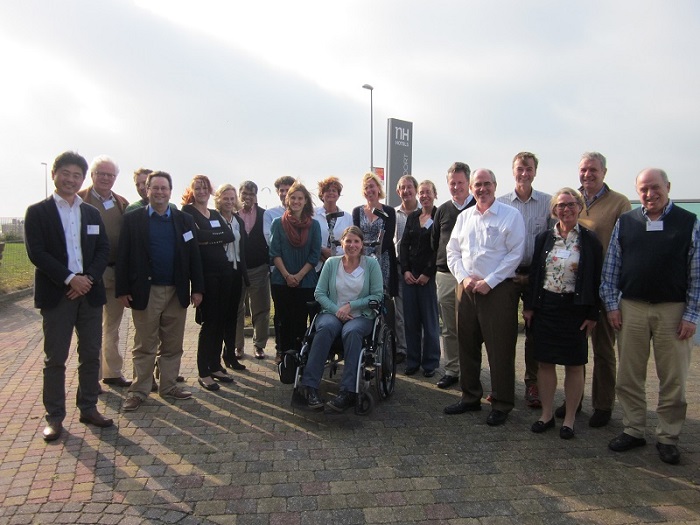Clinicopathological classification of Immune-mediated necrotizing myopathies
- Number 224
- Date 14 October 2016
Location: Zandvoort, The Netherlands
Translation of this report:
German Translation
French Translation
Organizers: Prof. W. Stenzel (Germany), Prof. O. Benveniste (France), Dr. Y. Allenbach (France) and Dr. A. Mammen (U.S.A.)
A multidisciplinary group of 20 participants from eight different countries attended this workshop in Zandvoort, The Netherlands, including clinical and basic researchers and one patient representative.
Participants: Dr. Y. Allenbach (internist, France), Dr. A. Amato (neurologist, USA), Dr. A. Aussy (PhD student, France), Prof. O. Benveniste (internist, France), Prof. J. de Bleecker (neurologist, Belgium), Dr. A. Corse (pathologist, USA), Mrs. I. de Groot (patient representative, The Netherlands), Mrs. N. Fischer (medical PhD student, Germany), Prof. H. Goebel (neuropathologist, Germany), Dr. D. Hilton-Jones (neurologist, UK), Dr. J. Lamb (geneticist, UK), Prof. I. Lundberg (rheumatologist, Sweden), Dr. A. Mammen (neurologist, USA), Prof. T. Mozaffar (neurologist, USA), Dr. I. Nishino (pathologist, Japan), Dr. A. Pestronk (pathologist, USA), Prof. U. Schara (paediatric neurologist, Germany), Prof. W. Stenzel (neuropathologist, Germany), Prof. M. de Visser (neurologist, The Netherlands)

Summary of the workshop from a patient´s perspective:
Aim of the workshop: to reach international consensus on the pathological and clinical criteria of IMNM and its possible subtypes. Another aim was to agree on guidelines for diagnosis and treatment schemes.
As a patient representative I was invited to participate in the previous ENMC workshop in 2015, which was dealt with the outcome measures and clinical trial readiness in Idiopathic Inflammatory Myopathies (IIM). The timing for this 2016 workshop solely on IMNM was perfectly planned, since clinicians and researchers recently have discovered more and more about these rare subtypes of myositis. On the other hand there also appears to be a lack of evidence-based guidelines for treating myositis patients. What is needed now is a consensus on diagnostic criteria and preferably also on guidelines for therapeutic options, which can be disseminated to every doctor concerned. This is very important since IMNM can show a very severe course of disease.
In two days all attendants presented new data and findings from trials and research in their respective countries, followed by lively discussions. A lot of hard work was done by dedicated myositis experts. We focussed on pathological and clinical criteria of IMNM, on serology (= detection of auto-antibodies in blood samples), genetics (= science on heredity), pathology (science of microscopic features in tissue) and also on treatment strategies.
My contribution as a patient was sharing my story of living with this chronic and rare disease: its impact on every aspect of my life and the challenges and limitations that come with myositis. During the following sessions I was invited several times to express my opinion on things (e.g. on muscle biopsies and on the importance of physiotherapy and exercise) and join the discussions.
Outcomes of the workshop:
- Consensus on clinical definition of IMNM
- Agreement on subdivision of IMNM types
- Agreement on clinical and pathologic diagnostic criteria
- Consensus on therapeutic guidelines
I was impressed how studies done by all these myositis experts in different parts of the world led to similar findings. In the course of the workshop it appeared that this knowledge led them to believe that the time was ripe to reach agreement on subdividing the IMNM on the basis of specific auto-antibodies (anti-SRP and anti-HMGCR). And subsequently also to agree on clinical and pathological diagnosis criteria and propose treatment options for each subtype. What a beautiful and promising outcome of this unique workshop!
Ingrid de Groot, patient representative, The Netherlands
Norina Fischer, medical PhD student, Germany
A full report is published in Neuromuscular Disorders (pdf).
